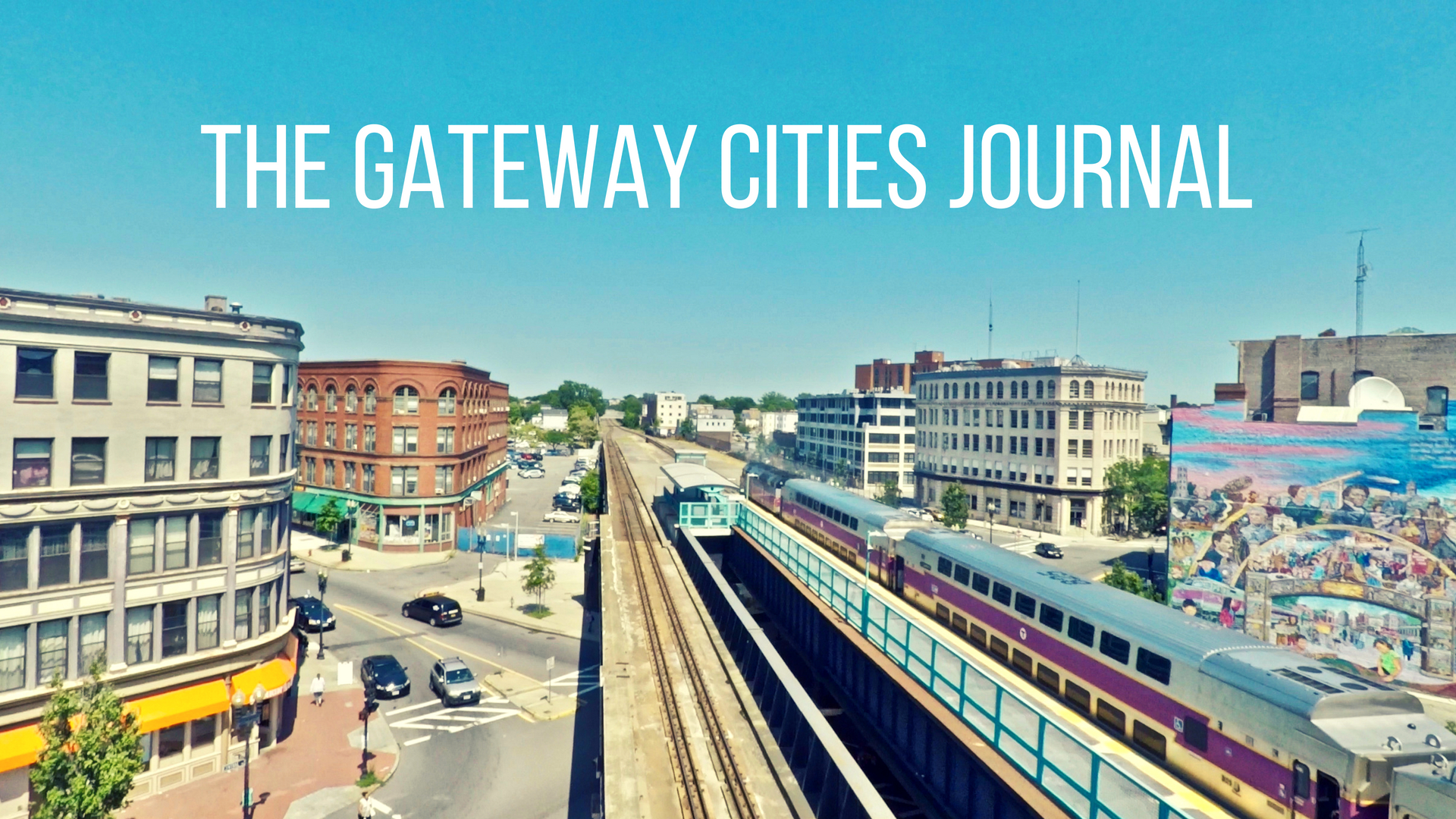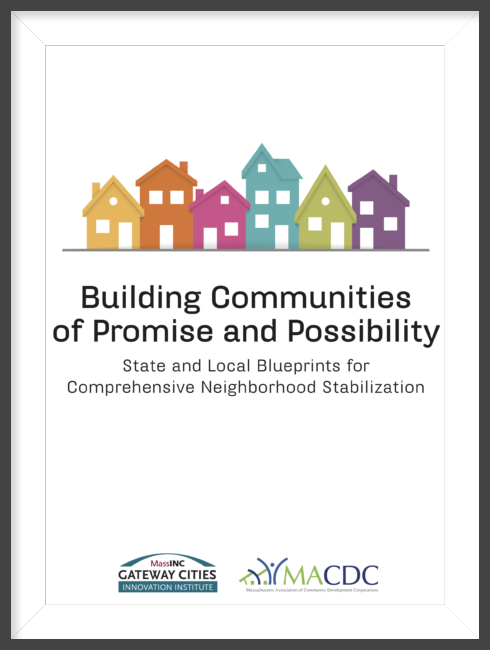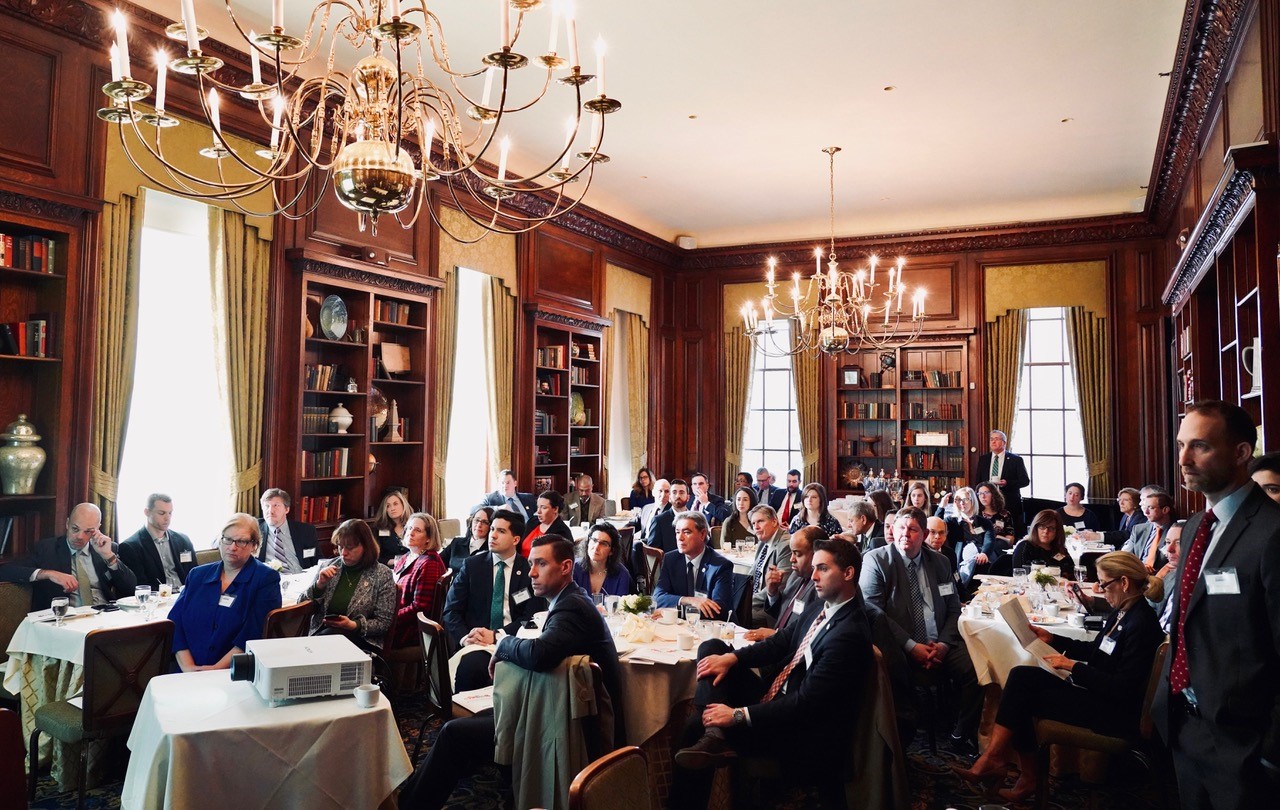
Housing leaders gathered with members of the Gateway Cities Legislative Caucus on Wednesday for a breakfast forum on neighborhood stabilization policy. Together they reviewed a strategy blueprint for comprehensive state and local neighborhood revitalization efforts that we hope will become a major focus in the 2019-2020 legislative session.
 The arguments for making neighborhood stabilization a priority for the Commonwealth’s policymakers are compelling. First, there is an ever growing body of evidence showing that, independent of family and other socioeconomic factors, neighborhood conditions play a crucial role in shaping the economic trajectory and lifelong well-being of their residents. Second, dense Gateway City neighborhoods contain an outsize share of the state’s housing stock. When low property values lead to neglect, blight, and abandonment, we lose these older, relatively affordable homes and replacing them with new inventory is extremely expensive.
The arguments for making neighborhood stabilization a priority for the Commonwealth’s policymakers are compelling. First, there is an ever growing body of evidence showing that, independent of family and other socioeconomic factors, neighborhood conditions play a crucial role in shaping the economic trajectory and lifelong well-being of their residents. Second, dense Gateway City neighborhoods contain an outsize share of the state’s housing stock. When low property values lead to neglect, blight, and abandonment, we lose these older, relatively affordable homes and replacing them with new inventory is extremely expensive.
Massachusetts does not currently have a comprehensive approach to neighborhoods. Our Gateway City revitalization efforts have largely focused on downtowns. While this work is slowly bearing fruit, ultimately it will not succeed without paying similar attention to the health of surrounding residential neighborhoods.
These neighborhoods haven’t recovered from the devastating blow inflicted by the foreclosure crisis. The data are stark: Since 2000, the number of Gateway City neighborhoods with poverty rates over 40 percent has doubled, vacancy rates are up by 50 percent or more, and 6,000 homeowners have been lost.
The foreclosure crisis and other external economic forces played a destabilizing role, but we must acknowledge that our public policy choices have also contributed to these conditions. Compared with 1980, the federal CDBG block grants that Gateway Cities rely heavily upon for neighborhood improvement efforts has declined by $100 million annually. Cuts to non-school state aid and other state fiscal trends have also forced local governments to cut back sharply on staffing for housing and community development, as well as for the municipal building and health departments responsible for code enforcement, and public works departments that play a vital role in maintaining neighborhood infrastructure.

We must acknowledge the predicament that Gateway City neighborhoods now face, and recognize that we can do something about it. Massachusetts is fortunate to have many deeply skilled housing and community development experts who can provide the leadership and policy imagination required to do this work at a high level. To get the conversation started, MassINC and the Massachusetts Association of Community Development Corporations convened these leaders for a series of conversations during the fall of 2018. The blueprint for a comprehensive neighborhood stabilization strategy that was shared with the Legislative Caucus this week emerged from these discussions.
The blueprint is grounded by one core principal: neighborhoods are multifaceted social, economic, and physical entities; as such, revitalization requires a multi-sectoral effort. From medical providers to educators and public safety officials, we will need to work together to ensure that all Massachusetts neighborhoods are truly places of promise and possibility.
Housing & Economic Development
The New Bedford port, for the 18th year in a row, reported the highest level of fish landings in the country by value.
Wayfair receives $31 million in state tax breaks to expand in Boston and Pittsfield.
Springfield’s Mayor Domenic Sarno announces that one-third of the 3 percent sales tax imposed on recreational marijuana sales will go towards neighborhood stabilization funds for neighborhoods within a mile of a dispensary.
Now that Worcester’s union station has secured the state Cannabis Control Commission as a major new tenant, the station is poised to welcome two breweries looking to set up shop in the retail space below the parking garage.
Study suggests Massachusetts’ “other” housing problem is worsening. Blighted and abandoned housing presents serious challenges for Gateway City neighborhoods
The Worcester Regional Chamber of Commerce hosts a breakfast on Opportunity zones.
UMASS Boston’s Center for Social Policy holds a webinar on January 29th on cliff effects.
Massachusetts squanders a record $88.9 million in film tax credits.
Brookings Institution Senior Fellow Alan Berube publishes a new piece calling for more attention to midsize metro areas.
Governing looks at the impact of recent federal tax reform on the sale of municipal bonds and finds that it hasn’t been as bad as many predicted.
Education
The Globe praises Brockton’s grassroots approach to expand access to youth and adolescent sports.
Holyoke Rep. Aaron Vega joins other Gateway City leaders at the State House to press for action on an education funding bill.
At a New Bedford forum, school officials gather to talk about the intense financial difficulties they face.
State Education Commissioner Jeff Riley returns to Lawrence to discuss progress at two local elementary schools.
Lynn Tech Skills USA fundraised over $10,000 to purchase 20,000 reading books for children to promote literacy and workforce preparedness.
Transportation
Plans are underway to develop the 45 acres of land owned by the Footprint Power Salem Harbor Station on Fort Avenue, which means a second ferry could be implemented by early 2020.
The MBTA wins federal approval for a six-month extension of its $10 ride-all-you-want weekend commuter rail fare.
Governance
Some in Fall River want to ditch the strong-mayor form of government in favor of putting a professional city manager in charge.
Lowell city councilors met to discuss plans for how the city should allocate the revenues from the anticipated recreational marijuana 3-percent tax.
Lynn Mayor Thomas McGee discusses his first year in office, with a focus on the city’s cash crunch.
Quincy officials worry that a Trump administration effort to ask about citizenship in the 2020 Census will depress the city’s count because of its large Asian immigrant population.
Creative Placemaking
Haverhill unveils a colorful new mural celebrating the cities immigrant history.
“Is New Bedford arts and culture gay enough?” asks Steven Froias.
Salem wins a $400,000 grant to continue the development of Gallows Hill Park into a more accessible greenspace.
The Worcester City Council will soon allow for the expansion of urban agricultural opportunities, such as community gardens, in all zoning districts.
Communities & People
One of the largest national gatherings of woodworkers in the country takes place this weekend in Springfield.